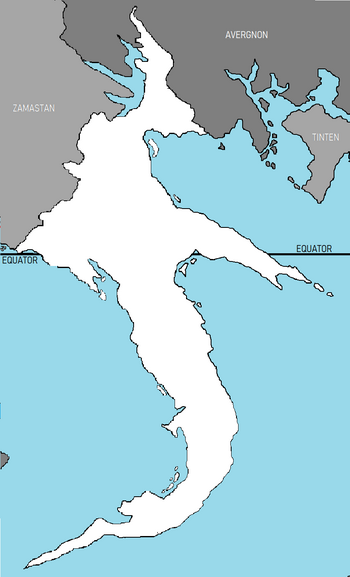Drambenburg
Holy Empire of Drambenburg | |
|---|---|
|
Flag | |
| Motto: "Helfen, Wehren, Heilen" or "Suum cuique" | |
| Anthem: Heil dir im Siegerkranz | |
 | |
| Capital | Lerbin |
| Official languages | Drambenburgian |
| Ethnic groups | Drambens Wejarks Plodinks Shemulites |
| Demonym(s) | Drambenburgian |
| Government | Constitutional Representative Parlimentary Militarized Monarchy |
| Peter XXI Wettin | |
| Walde Herzog | |
| Establishment | |
| 805 | |
| 1303 | |
| 1822 | |
| Area | |
• Total | 504,226 km2 (194,683 sq mi) |
• Water (%) | 8.4 |
| Population | |
• 2020 census | 52,369,727 |
• Density | 104/km2 (269.4/sq mi) |
| GDP (PPP) | estimate |
• Total | 2.6 Trillion |
• Per capita | 45,000 |
| Currency | Drambs (∂) |
| Date format | mm-dd-yyyy |
| Driving side | right |
| Calling code | +23 |
The Holy Empire of Drambenburg, most commonly known as Drambenburg is a nation located on the continent of Euronia in the Coalition of Crown Albatross. It is bordered to the north by Avergnon and Zamastan. Drambenburg also holds dependency over the Achtundachtzig Islands in the South Toyana Ocean. Drambenburg is known for its historical significance in the history of Iearth, specifically in the 14th century with the Fifty Years War and in the 20th century with the the World War (1949-54). It was one of the founding members of the C.C.A. in 1975. Today, Drambenburg is a federal parliamentary monarchy led by an Obergruppenkaiser (king) and a Oberkanzlerin (Upper Chancellor).
Drambenburg is a regional power with a strong economy; it has one of the largest economies in the world and is a global leader in several industrial and technological sectors. A highly developed country with a very high standard of living, it is known for its long and rich cultural history.
Etymology
History
Pre-history
First Alliance Period (805-1200)
Second Alliance Period (1280-1500)
Fifty Years War (1337-89)
Third Alliance Period (1550-1845)
Fourth Alliance Period (1822-1956)
The World War (1949-54)
Fifth Alliance Period (1956-Present)
February Rising
February of 2020 the proletariat, tired of the overbearing capitalist government, rose up in arms in response to the shooting of an environmentalist activist at a rally held outside of capitol mall. James G. Kirk, the environmentalist, was assassinated for pressing the monarch to intervene in recent environmental destruction of the inland waterways by the Koca Kollabra food company through the end of 2019. After the brutal public execution of Kirk, the people of Lerbin took to the streets in protest. Not long after protests began, citizens armed themselves in response to several shootings by the Lerbin PD. Despite their best efforts to make amends for the unfortunate situation, the people could not be quelled. The president demanded that the military step in, but many members of the military joined the uprising, sick of the pressure placed on them by the bourgeoisie. On February 29, 2020, the revolutionaries broke through the barricade at the military prison complex of Buchenwald, revealing the systemic oppression and execution of minorities in Drambenburg by the executive and Khakus. Enraged, the leader of the Proletariat, Dietrich Winkler began pushing the House of Lords to hand over emergency powers. After a vote of no-confidence in Wilfred Kocher, the Prime Minister, deposing him and replacing him with Paul Lehmkuhl who was given emergency powers on the 1st of March, declaring himself the First Imperial Despot of Drambenburg. In response, the Senate called for a re-vote on the emergency powers to Winkler, which was successful. On March 3, 2020, the Proletariat -- now referring to themselves as the Red Party -- marched into the Imperial Palace and dragged out Obergruppenkaiser Peter XXI Wettin and executed him in the center of the mall, along with his wife and four children.
Geography
The majority of Drambenburg's topography is a river delta. The vast floodplains of the Rhine River lend to large portions of Drambenburg being uninhabitable except for by stilted houses and boats for nearly four months of the year.
Politics
Government
Law
Foreign Relations
Military
Active Duty Service Members: 1,205,362 Reserve Military Members: 3,309,072 Army: 602,681 Navy: 401,787 Marines: 144,643 Air Force: 200,893
Wehrmacht
Most of the Army of Drambenburg is involved in non-frontline work, such as the Wehrmacht Corps of Engineers. The arms of standard infantry are the G66k.
Kriegsmarine
The Kriegsmarine is composed of three fleets; the Drambenburg Carrier Fleet, the Destroyer Fleet, and the Submarine Fleet.
Marines
One subset of the Kriegsmarine is the Royal Marines. The Royal Marines focus on warfare on sea, land, and air. The Marines are comprised mostly of special force troops who engage in landing attacks and HALO missions.
Luftwaffe
Most of the Drambenburgian air force (Luftwaffe) is composed of unmanned fighter jets and ultra-long-range hypersonic bombers.
Cities
See also: Cities in Drambenburg
|
Metropolitan areas in Drambenburg | |||||
| No. | CMA City |
Population | |||
| 1 | Durenurbergering | 9,398,000 | |||
| 2 | Lerbin | 6,523,000 | |||
| 3 | Wein | 5,298,000 | |||

